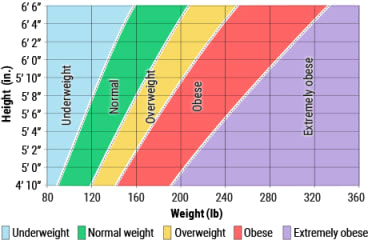
Overview
Body mass index (BMI) can help you see if your weight is raising your risk for health problems. It uses a formula to compare how much you weigh with how tall you are.
- A BMI lower than 18.5 is considered underweight.
- A BMI between 18.5 and 24.9 is considered healthy.
- A BMI between 25 and 29.9 is considered overweight. A BMI of 30 or higher is considered obese.
If your BMI is in the normal range, it means that you have a lower risk for weight-related health problems. If your BMI is in the overweight or obese range, you may be at increased risk for weight-related health problems, such as high blood pressure, heart disease, stroke, arthritis or joint pain, and diabetes. If your BMI is in the underweight range, you may be at increased risk for health problems such as fatigue, lower protection (immunity) against illness, muscle loss, bone loss, hair loss, and hormone problems.
BMI is just one measure of your risk for weight-related health problems. You may be at higher risk for health problems if you are not active, you eat an unhealthy diet, or you drink too much alcohol or use tobacco products.
Follow-up care is a key part of your treatment and safety. Be sure to make and go to all appointments, and call your doctor if you are having problems. It's also a good idea to know your test results and keep a list of the medicines you take.
How can you care for yourself at home?
- Practice healthy eating habits. This includes eating plenty of fruits, vegetables, whole grains, lean protein, and low-fat dairy.
- If your doctor recommends it, get more exercise. Walking is a good choice. Bit by bit, increase the amount you walk every day. Try for at least 30 minutes on most days of the week.
- Do not smoke. Smoking can increase your risk for health problems. If you need help quitting, talk to your doctor about stop-smoking programs and medicines. These can increase your chances of quitting for good.
- Limit alcohol to 2 drinks a day for men and 1 drink a day for women. Too much alcohol can cause health problems.
If you have a BMI higher than 25
- Your doctor may do other tests to check your risk for weight-related health problems. This may include measuring the distance around your waist. A waist measurement of more than 40 inches in men or 35 inches in women can increase the risk of weight-related health problems.
- Talk with your doctor about steps you can take to stay healthy or improve your health. You may need to make lifestyle changes to lose weight and stay healthy, such as changing your diet and getting regular exercise.
If you have a BMI lower than 18.5
- Your doctor may do other tests to check your risk for health problems.
- Talk with your doctor about steps you can take to stay healthy or improve your health. You may need to make lifestyle changes to gain or maintain weight and stay healthy, such as getting more healthy foods in your diet and doing exercises to build muscle.
Where can you learn more?
Go to http://www.healthwise.net/patientEd
Enter S176 in the search box to learn more about "Body Mass Index: Care Instructions".
Current as of: March 1, 2025
Author: Ignite Healthwise, LLC Staff
Clinical Review Board
All Ignite Healthwise, LLC education is reviewed by a team that includes physicians, nurses, advanced practitioners, registered dieticians, and other healthcare professionals.

